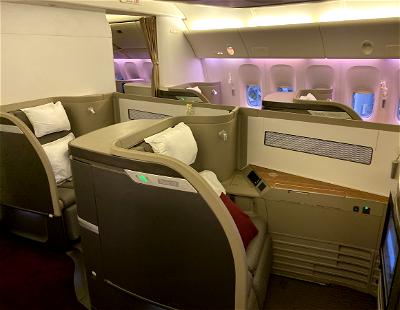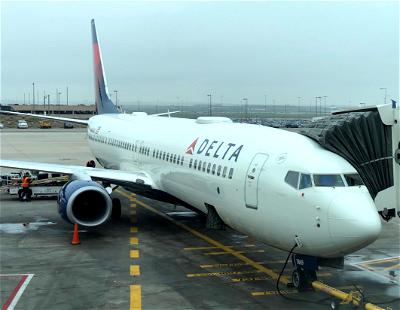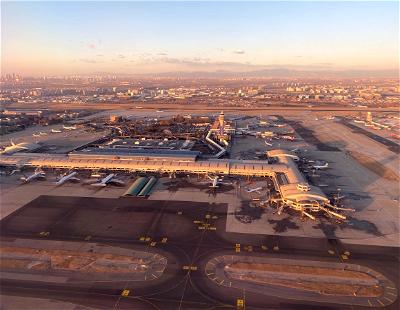The airline industry is seeking a $60 billion bailout after having spent 96% of free cash flow over the past decade on stock buybacks, to enrich executives and investors (as one does). Boeing is also asking for a $60 billion bailout.
Well, the hotel industry is now, like, “hold my beer,” and is asking for $250 billion from the government. Yep, a quarter of a trillion dollars. Or to put it differently, that’s 250,000 of these:

Is there more merit to their request, though, or are taxpayers about to get Bonvoyed?
In this post:
COVID-19 impact on the hotel industry
The CEO of the American Hotel & Lodging Association has said that the reduction in travel resulting from the COVID-19 crisis is already more severe than 9/11 and the 2008 recession combined.
In major cities that are used to high rates and occupancy, we’re now seeing occupancy of under 20%. This includes cities like Austin, Boston, San Francisco, and Seattle. As he explains:
“Our 33,000 small business hotels across the country are facing the difficult decision right now to close their doors and lay off millions of people over the next several days. Not weeks. Not months. But days.”
Marriott furloughing tens of thousands of people
Marriott is the world’s biggest hotel operator, and yesterday revealed that they plan to furlough tens of thousands of their employees at managed properties. This includes both furloughing employees at hotels that are shutting down, as well as reducing staffing at hotels that are still operating.
While furloughed, Marriott won’t pay salaries, though in most cases they’ll still be receiving health benefits. This Tweet about Marriott’s approach to getting laid off is getting quite a bit of attention:
My brother got laid off yesterday from Marriott.
He applied for unemployment; they called to check his employment status.
Marriott HR says he’s NOT laid off but on a ZERO hour schedule. So he can’t qualify for unemployment NOR does he have health insurance.
— thot leedurr (@DocDre) March 17, 2020
The hotel industry wants $250 billion
While airlines are asking for a cool $60 billion(ish), the hotel industry is looking for $250 billion. How would this be used?
- $150 billion would be used to allow hotel owners to continue to make loan payments and support employees who are being laid off
- $100 billion would go to suppliers
I feel like when we start talking about amounts in the billions or trillions we lose sight of just how much money that is. The US has a population of about 330 million people, so when you divide $250 billion by that, you’re looking at somewhere around $758 per person for the hotel industry. YOW.
Rewarding irresponsible behavior?
I think most of us can agree that:
- This situation is kind of unprecedented
- Individuals and small businesses need some kind of relief
I think a lot of us struggle with how much help big businesses deserve, though:
- Obviously the travel industry (including airlines and hotels) is vital to the health of the overall economy
- At the same time, it’s kind of obnoxious when big corporations spend most of their cashflow on stock buybacks to boost their share price, only to not even have enough reserves to operate for a few months if things take a turn for the worse
Are we supposed to feel bad for American Airlines, which has spent billions of dollars on share buybacks, rather than keeping cash reserves and/or not financing the heck out of everything (as they now have over $30 billion in debt)? During good times taxpayers don’t get anything from them, and then during bad times they’re expected to bail out the airlines?
Yes, the industry needs to continue, but does the cycle ever end if companies can always use the government as a crutch?
Is there more merit to hotel aid than airline aid?
With the above out of the way, there is an important distinction to make with the hotel industry, though. A majority of hotels aren’t owned by the actual global hotel groups, but rather are owned by individual investors. The major global hotel groups simply charge a management or franchise fee.
This is a bit different than the airline industry, for example, which is exclusively “big business.” With hotels:
- Plenty of smaller hotels operate on a franchise model, so your roadside Hampton Inn might be owned by an individual who spent their whole life saving up to buy their own hotel, and relies on this to make a living
- Then there are all kinds of major hotels (ones that cost hundreds of millions of dollars) that are owned by multi-billion dollar venture capital firms
- Only a small percentage of hotels belonging to the global hotel groups are owned directly by Marriott, Hilton, etc.
That means there’s a huge variety of ownership structures here:
- Does Wyndham directly deserve aid, when they spent nearly $400 million on stock buybacks last year?
- Does a small business owner who runs a Wyndham property deserve some help?
- Does a hotel owned by a multi-billion dollar venture capital firm deserve help?
Bottom line
This is obviously all very complicated, though it’s noteworthy that the hotel industry wants more than 4x as much government aid as the airline industry. At this point I don’t know what to make of any of this anymore.
I do think there’s an important distinction to be made with the hotel industry vs. the airline industry, which is that thousands of hotels around the country are run by individuals on a franchise basis, and in my opinion many of those people do deserve help.
Personally I feel less sympathetic towards those properties owned directly by the global hotel groups, and those owned by venture capital firms. But that’s just me.
I guess my take is:
- It’s ridiculous how financially irresponsible big corporations are, not at all preparing for a rainy day
- Individuals and small businesses should get relief before big businesses (or at least at the same time, while right now we’re seeing the opposite)
- At the same time, if big businesses fail the economy will collapse completely, and that’s bad for small businesses and all of the hardworking frontline employees who would be laid off
- If the government bails out big businesses, they’ll never learn their lesson
- This is a cycle that never ends…
What’s your take on this — should the hotel industry get a $250 billion bailout, and if so, what restrictions should it come with, if any?





Ahha. Now I've got your attention. The truth is, local governments love hidden fees because they know its a better lure for travelers. Anything to get at that TOT. If you're going to build a hotel and the competition permits, the cities will give a big thumbs up if you want to charge hidden fees.
On this blog, ignorance is bliss. Resort fees (and destination fees) are mandated by the cities, never the hotels. You cannot charge more than you advertise, because that would be a tax: only the government can tax. In other words: resort and destination fees are additional taxes, charged by hotels to their customers, then paid 100% to the city/local government you're staying at, in addition to the TOT (transient occupancy tax), which is usually >...
On this blog, ignorance is bliss. Resort fees (and destination fees) are mandated by the cities, never the hotels. You cannot charge more than you advertise, because that would be a tax: only the government can tax. In other words: resort and destination fees are additional taxes, charged by hotels to their customers, then paid 100% to the city/local government you're staying at, in addition to the TOT (transient occupancy tax), which is usually > 10%. In total, one can pay up to 30% in "hotel taxes". A big DOH to everyone here.
@ MrHotel -- That's... simply false. If they're mandated by cities, then why do some hotels in a destination have resort fees, and others don't?
Bailouts rescue the equity and debt holders. Without the bailouts, these two groups would need to work out a way to rescue the business and both groups would need to write down the value of their assets. The assets would continue to have value and continue to operate (or be brought back online eventually). Bailouts, in essence, allows equity and debt holders to kick the can down the road in the hope that everything will...
Bailouts rescue the equity and debt holders. Without the bailouts, these two groups would need to work out a way to rescue the business and both groups would need to write down the value of their assets. The assets would continue to have value and continue to operate (or be brought back online eventually). Bailouts, in essence, allows equity and debt holders to kick the can down the road in the hope that everything will return to normal. If they _don't_ return to normal, they will either get another bailout or have to hash out how to keep the business going.
I prefer forcing the equity and debt holders to work out a solution and to leave bailouts off the table or make them very onerous. Corporations like American Airlines (and many others) have been irresponsible with their stock buybacks and high levels of leverage. The moral hazard of condoning this behavior (via a bailout) is that corporations will gear up to do it again. When the good times return, they will increase buybacks and leverage yet again. Lenders will likewise be too loose with their lending standards and make risky loans. Net, we'll be back here again only worse.
In the heat of the moment, our government is probably going to make the same mistake it did during the financial crisis and bailout reckless corporations and reward the risk-takers while punishing the savers. It's the wrong choice.
Not sure you can call this a rainy day... this is Hurricane Sandy.
What Eskimo said LOL
@Yolo
"Lucky, please dont make the hotel industry look as evil as the airlines."
The industry lost me and probably most of us at resort fees.
The industry lost me again at destination fees.
They lost me at not giving points or benefit if I book through OTA.
They lost me with the pictures of the room vs my actual room.
They lost me at sorry no upgrades available, we...
@Yolo
"Lucky, please dont make the hotel industry look as evil as the airlines."
The industry lost me and probably most of us at resort fees.
The industry lost me again at destination fees.
They lost me at not giving points or benefit if I book through OTA.
They lost me with the pictures of the room vs my actual room.
They lost me at sorry no upgrades available, we are sold out, but you still sell those rooms online.
They lost me with soap and shampoo dispensers using environment as excuse.
They lost me when they charge me $50 valet parking but the garage next door is $5 and said nothing about it.
And the list goes on and on and on.
To be honest, hotel industry is more evil than airlines. We are just fortunate to have a lot more competition than airlines so we don't need to voice our complains too much. Imagine entire USA with only 3 hotel brands, they probably will charge bag fees too.
With that out of the way, I do feel bad for everyone affected by the virus. No sane business would or should prepare for apocalypse. Travel industry is huge and hurts everyone. No flight means no hotel, no car rental, no dining. That's millions of jobs.
@MDA
I don't think hotels in Geylang are representing hotel industry in Singapore. And I thought bus drivers sleeps on the bus.
FYI Netflix in Australia has different (but seems better) content than USA.
So Singapore hotels are housing the 300,000 Malaysians who commute to Singapore each day as the road border has now been closed via JB. They are typically low income folk eg bus drivers. I understand that the both the hotels and companies have negotiated special rates. Whilst they are not likely to be at FS or MBS, they are at decent hotels. Great idea....hotels get some revenue, essential services continue and more important the Malaysians...
So Singapore hotels are housing the 300,000 Malaysians who commute to Singapore each day as the road border has now been closed via JB. They are typically low income folk eg bus drivers. I understand that the both the hotels and companies have negotiated special rates. Whilst they are not likely to be at FS or MBS, they are at decent hotels. Great idea....hotels get some revenue, essential services continue and more important the Malaysians continue to get paid.
Enjoy your party. I have just completed night 1 of mandatory isolation (just returned to Australia). The good news is I can work from home. The bad news is I can work from home. Will try and stream it in the background. Have fun!
BTW - can we please have a post dedicated to Netflix recommendations, websites to read that aren’t doom and gloom?
Have fun and stay safe!
Can we get a bailout on our point devaluation through the years?
While I don’t like it I can live w airline bailouts since a financial secure, nationwide system of flights is beneficial to the country.
With respect to hotels (and casinos) however, HELL NO. There are too many hotels. Let some go out of business. Also there are already safety nets or proposals in place for people that lose their jobs so that shouldn’t be in any bailout package.
There simply isn’t enough money...
While I don’t like it I can live w airline bailouts since a financial secure, nationwide system of flights is beneficial to the country.
With respect to hotels (and casinos) however, HELL NO. There are too many hotels. Let some go out of business. Also there are already safety nets or proposals in place for people that lose their jobs so that shouldn’t be in any bailout package.
There simply isn’t enough money and we need to let a lot of businesses fail then start building back again.
I would ask that the independent hotel contractors not be forgotten as various relief packages are being considered. We do not qualify for any benefits or unemployment compensation of any kind.
I don't get why people keep calling this something unforeseeable. A pandemic is absolutely a foreseeable risk to the travel industry. Whoever has been caught with their pants down shouldn't expect a bailout when they don't share the profits (via paying their FAIR share of tax) during the good times.
Congress should make the elimination of resort fees a precondition for any hotel bailout.
Lucky, please dont make the hotel industry look as evil as the airlines. I work for a medium sized, privately owned hotel chain. The owners have to pay monthly salaries for over 5,000 employees and families with zero cash flow, and even though they have saved for a rainy day, this is not a rainy day. You cant imagine how quickly reserves dry up with ZERO income.
Our company and owners run a few...
Lucky, please dont make the hotel industry look as evil as the airlines. I work for a medium sized, privately owned hotel chain. The owners have to pay monthly salaries for over 5,000 employees and families with zero cash flow, and even though they have saved for a rainy day, this is not a rainy day. You cant imagine how quickly reserves dry up with ZERO income.
Our company and owners run a few charities outside the US that are not tax deductible and are nothing but supportive to all of us during this situation, and like our company, theres hundreds more around the world.
The hotel industry directly employs millions more than all US airlines combined, and millions indirectly through suppliers that range from food and bev to simple things such as linens, towels, soap, and local artesanal products. And also worth to mention all the shops around a hotel that thrive of the hotel clients. Simply put, we need help.
Marriott and Hyatt are down 35-40% just today. At this rate they will be insolvent at the end of the week.
With that being said, I could see the Pritzker's taking Hyatt private if the stock falls far enough.
Which political party gets the most money from the hospitality industry?
@Staradmiral
You're missing the fact. 6 month emergency fund is not the same as 6 months of vacancy.
Yes, 6 month emergency fund applies to individual investors. I'm sure most hotel investors have those 6 month. The owners probably can survive but the hotel itself wont. However, many are operated as a family run business. Those will unlikely have LLC way of operating and pump their own money to keep the hotel alive. If you...
@Staradmiral
You're missing the fact. 6 month emergency fund is not the same as 6 months of vacancy.
Yes, 6 month emergency fund applies to individual investors. I'm sure most hotel investors have those 6 month. The owners probably can survive but the hotel itself wont. However, many are operated as a family run business. Those will unlikely have LLC way of operating and pump their own money to keep the hotel alive. If you own a single business you will understand.
What the bailout doesn't discuss much is the distribution of funds. What would be disgusting is Marriott will get millions and a family run Days Inn will get only hundreds.
@LiuX: and that indeed is one of the big issues of unfiltered capitalism. In the countries that Americans like to call "socialist" this money (retirement funds etc.) usually ends up in real estate investments or low interest government bonds. Anything that is considered to be rather low risk. Why? Because the perception is that THESE PARTICULAR FUNDS are too valuable and critical for use in high risk (stock) investments, since they are so crucial for...
@LiuX: and that indeed is one of the big issues of unfiltered capitalism. In the countries that Americans like to call "socialist" this money (retirement funds etc.) usually ends up in real estate investments or low interest government bonds. Anything that is considered to be rather low risk. Why? Because the perception is that THESE PARTICULAR FUNDS are too valuable and critical for use in high risk (stock) investments, since they are so crucial for the long term well being of those paying into those funds. If you, as a payer, felt that the return from those funds is too low, and you wanted more money in your pocket, you had to put YOUR OWN savings in higher interest (and risk) investments.
@Wesley G: it is exactly that what I obviously do not understand about economy. In the heydays a cooperation can blackmail the government (through threatening job cuts, moving they cooperate headquarters) into paying little to no taxes, not allowing the formation of a union, and so on. Anything for the profit of the shareholder. But then, the next day when the bear suddenly enters the scene, I can ask for unlimited bailouts.
Just as an FYI to all of you claiming Marriott and the hotel industry shouldn't get a dime. Please re-read the portion of the article that points out that the majority of hotels are owned and operated by Franchisees. These are literally family owned and often family operated entities that are trying to stay afloat in a financial crisis brought on by an "Act of God".
You do not EVER EVER invest everything into one thing. "never put all your eggs into one basket". If an individual put their whole retirement into one hotel, that's on them. And the next rule of investing is to always have a 6 month emergency fund. They should be able to survive 6 months of vacancy.
I, frankly, think that Elizabeth Warren's conditions for any bailouts are what we should adhere to:
1. Companies must maintain payrolls and use federal funds to keep people working.
2. Businesses must provide $15 an hour minimum wage quickly but no later than a year from the end.
3. Companies would be permanently banned from engaging in stock buybacks.
4. Companies would be barred from paying out dividends or executive bonuses while they receive federal...
I, frankly, think that Elizabeth Warren's conditions for any bailouts are what we should adhere to:
1. Companies must maintain payrolls and use federal funds to keep people working.
2. Businesses must provide $15 an hour minimum wage quickly but no later than a year from the end.
3. Companies would be permanently banned from engaging in stock buybacks.
4. Companies would be barred from paying out dividends or executive bonuses while they receive federal funds and the ban would be in place for three years.
5. Businesses would have to provide at least one seat to workers on their board of directors, though it could be more depending on size of the rescue package.
6. Collective bargaining agreements must remain in place.
7. Corporate boards must get shareholder approval for all political spending.
8. CEOs must certify their companies are complying with the rules and face criminal penalties for violating them.
I think that your point on the irresponsibility of corporate management is incorrect - this is a problem of Western modern financial theory both at the corporate and personal level. What is extraordinary are the companies and people with large savings who like the ant in Aesop's fable, actually socked away during the good times.
That the strongest airlines are able to survive for a quarter or two with no incoming revenue isn't scandalous; it's...
I think that your point on the irresponsibility of corporate management is incorrect - this is a problem of Western modern financial theory both at the corporate and personal level. What is extraordinary are the companies and people with large savings who like the ant in Aesop's fable, actually socked away during the good times.
That the strongest airlines are able to survive for a quarter or two with no incoming revenue isn't scandalous; it's something that is espoused as sound personal finance. How many average Joes in America themselves actually have 3 months of savings, let alone 6, socked away?
I get your point, but at the same time I do struggle with it because this isn't really a "rainy day" -- I think it's fair to say that most of these companies were in good enough shape to deal with a garden-variety recession, or maybe even something as severe as the disruptions in 2001 or 2009, where revenue went down significantly. But this is shaping up to be a totally different scale of disruption...
I get your point, but at the same time I do struggle with it because this isn't really a "rainy day" -- I think it's fair to say that most of these companies were in good enough shape to deal with a garden-variety recession, or maybe even something as severe as the disruptions in 2001 or 2009, where revenue went down significantly. But this is shaping up to be a totally different scale of disruption for these industries, with revenue going basically to zero for a period of time, and I'm not sure how much is reasonable to expect companies to be prepared for. Should they have enough cash to pay all employees with zero revenue coming in for 2 weeks? For a month? For a year?
And I get that it's not totally fair that taxpayers should have to pick up that risk either, so maybe rather than government grants it should be loans or similar on favorable terms, so taxpayers are made whole once the industry gets back on its feet. But if thousands of hotels close, and possibly some big airlines liquidate, it will make it vastly harder for travel to resume in a normal way once things get moving again, which will prolong the economic pain for everyone.
No good answers here.
My friend works at the Four Seasons in Beverly Hills and told me their current occupancy rate is 15%.
Yet room rates there are still as high as they were one month ago.
Hotels dont seem to be lowering their prices at all.
What a fundamental misunderstanding you have of capitalism. These "multi-billion dollar" venture capital firms that you are describing - do you have any idea where most of their money comes from?
Let me give you a little bit of insight, much of it comes from pension funds and endowments which pay out the distributions from the income in these investments from these "multi-billion dollar" firms via their retirement plans or charitable grants, covering groups...
What a fundamental misunderstanding you have of capitalism. These "multi-billion dollar" venture capital firms that you are describing - do you have any idea where most of their money comes from?
Let me give you a little bit of insight, much of it comes from pension funds and endowments which pay out the distributions from the income in these investments from these "multi-billion dollar" firms via their retirement plans or charitable grants, covering groups like teachers, municipal and state police and fire organizations, hospital systems and health care workers and the most at risk in the community.
Maybe read a book and stop reading DNC talking points for a while.
If they didn’t keep buying $5 lattes and avocado toast (And stock buybacks) maybe they would have had a 6 month emergency fund
If I had a choice, I’d bail out local and regional hotel owners long before airlines. Airlines will exist regardless of a bailout because these companies will get favorable treatment in bankruptcy court. Hotels are much more tied to the local economies where they exist, particularly in small and rural communities. They drive traffic to local business, support convention and meeting activity, and help fund county CVBs. Plus, if hotels go dark they are EXTREMELY...
If I had a choice, I’d bail out local and regional hotel owners long before airlines. Airlines will exist regardless of a bailout because these companies will get favorable treatment in bankruptcy court. Hotels are much more tied to the local economies where they exist, particularly in small and rural communities. They drive traffic to local business, support convention and meeting activity, and help fund county CVBs. Plus, if hotels go dark they are EXTREMELY difficult to re-use or redevelopment. They just end up as multi-story abandoned hulks that drive down surrounding investment for years or even decades. Trickle down negative effects of a bankrupt hotel are far far worse than a bankrupt airline and it’s not even close.
US corporations celebrate capitalism in the good times and demand socialism in the bad times and the government happily follows along because they are making money too. If any business can make a few billion one year they should be able to lose a few billion the next.
And Lansing Michigan Hampton Inn still charges $130 plus tax for a Queen or King size bed for tonight
Give cash money to individuals and the individuals can choose who that want to support
You know those resort fee to the final bill... I would definitely would like to see small business owners being help, but that resort fee and other stuff left a bad taste.
Bottom line with travel industry is when things are going well, they helped themselves a LOT at customer expense. But when things start going bad, they want their customer to bail them out as taxpayers.
These type of behavior needs to change if they want bailouts.
How about we stop these bailouts and trickle down bullshit, which has never worked but rather encourage the same kinds of disgusting behavior over and over again?
Instead provide financial relief to individuals and small businesses directly. God knows they need all the help they can get against the rigged game of big corporate consolidations and duopolies.
F Marriott. Seriously. They should not get a freaking dime.
@ Ben -- Absurd, but they will undoubtedly get a bailout, and Trump Hotels will receive billions. Mark my word.
What were the hotels doing with all the mandatory "resort fees" I've been paying them all along?
The dotard will profit from this, because taxpayer money puts cash in his pocket for his already-failing hotels!!!!!!!1!
Corrupt to his core!!!!!!!!
I just recently contacted 10 or so high end hotels to ask if they had special pricing to account for the risk I would incur while traveling. They all just repeated the high prices posted online.
Only employees and associated small businesses (suppliers) should receive assistance. The thieving hotels with their "resort" and "destination" fees should get nothing. Certainly any kind of assistance must involve them rolling those back.
hahahaha these idiots think they're at the same level as banks and airlines
Government should issue the $250 b in the form of airline incidental credit that can only be used in category 1-4 airport lounges and then a month later move all airport lounges to category 5.